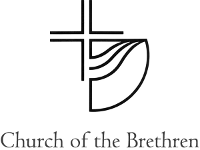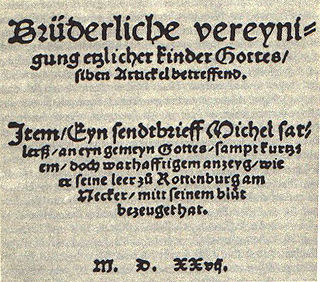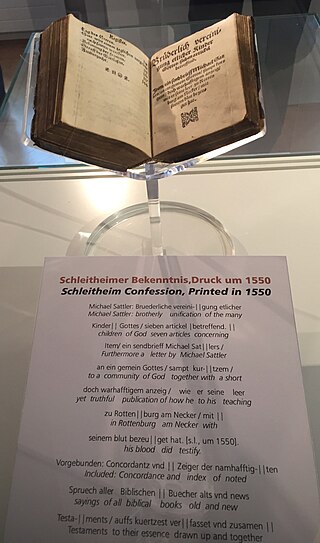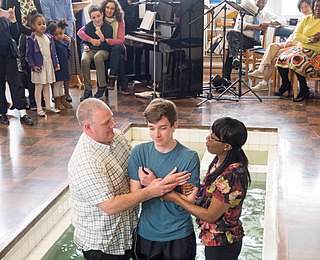Anabaptism is a Christian movement which traces its origins to the Radical Reformation.

Mennonites are a group of Anabaptist Christian church communities tracing their roots to the Radical Reformation. The name is derived from that of one of the early prominent leaders of the Anabaptist movement, Menno Simons (1496–1561). Through his writings about Reformed Christianity during the Radical Reformation, Simons articulated and formalized the teachings of earlier Swiss Anabaptist founders as well as early teachings of the Mennonites founded on the belief in both the mission and ministry of Jesus. The original Anabaptist followers had held such beliefs with great conviction, despite persecution by various Roman Catholic and Mainline Protestant states. Formal Mennonite beliefs were codified in the Dordrecht Confession of Faith (1632), which affirmed "the baptism of believers only, the washing of the feet as a symbol of servanthood, church discipline, the shunning of the excommunicated, the non-swearing of oaths, marriage within the same church", strict pacifistic physical nonresistance, anti-Catholicism and in general, more emphasis on "true Christianity" involving "being Christian and obeying Christ" as they interpret it from the Holy Bible.

The Church of the Brethren is an Anabaptist Christian denomination in the Schwarzenau Brethren tradition that was organized in 1708 by Alexander Mack in Schwarzenau, Germany during the Radical Pietist revival. The denomination holds the New Testament as its only creed. Historically, the church has taken a strong stance for nonresistance or Christian pacifism—it is one of the three historic peace churches, alongside the Mennonites and Quakers. Distinctive practices include believer's baptism by forward trine immersion; a threefold love feast consisting of feet washing, a fellowship meal, and communion; anointing for healing; and the holy kiss. Its headquarters are in Elgin, Illinois, United States.

The Schleitheim Confession was the most representative statement of Anabaptist principles, by a group of Swiss Anabaptists in 1527 in Schleitheim, Switzerland. The real title is Brüderliche vereynigung etzlicher Kinder Gottes siben Artickel betreffend ....

Plain people are Christian groups characterized by separation from the world and by simple living, including plain dressing in modest clothing. Many Plain people have an Anabaptist background. These denominations are largely of German, Swiss German and Dutch ancestry, though people of diverse backgrounds have been incorporated into them. Conservative Friends are traditional Quakers who are also considered plain people; they come from a variety of different ethnic backgrounds.

The Schwarzenau Brethren, the German Baptist Brethren, Dunkers, Dunkards, Tunkers, or sometimes simply called the German Baptists, are an Anabaptist group that dissented from Roman Catholic, Lutheran and Reformed European state churches during the 17th and 18th centuries. German Baptist Brethren emerged in some German-speaking states in western and southwestern parts of the Holy Roman Empire as a result of the Radical Pietist revival movement of the late 17th and early 18th centuries.

The Brethren Church is an Anabaptist Christian denomination with roots in and one of several groups that trace its origins back to the Schwarzenau Brethren of Germany.

The Brethren in Christ Church (BIC) is a River Brethren Christian denomination. Falling within the Anabaptist tradition of Christianity, the Brethren in Christ Church has roots in the Mennonite church, with influences from the revivals of Radical Pietism and the holiness movement. They have also been known as River Brethren and River Mennonites. The Canadian denomination is called Be In Christ.

The River Brethren are a group of historically-related Anabaptist Christian denominations originating in 1770 during the Radical Pietist movement among German colonists in Pennsylvania. In the 17th century, Mennonite refugees from Switzerland had settled their homes near the Susquehanna River, in the Northeastern United States.

Anabaptist theology, also known as Anabaptist doctrine, is a theological tradition reflecting the doctrine of the Anabaptist Churches. The major branches of Anabaptist Christianity agree on core doctrines but have nuances in practice. While the adherence to doctrine is important in Anabaptist Christianity, living righteously is stressed to a greater degree.
Peace churches are Christian churches, groups or communities advocating Christian pacifism or Biblical nonresistance. The term historic peace churches refers specifically only to three church groups among pacifist churches:
The Radical Reformation represented a response to perceived corruption both in the Catholic Church and in the expanding Magisterial Protestant movement led by Martin Luther and many others. Beginning in Germany and Switzerland in the 16th century, the Radical Reformation gave birth to many radical Protestant groups throughout Europe. The term covers radical reformers like Thomas Müntzer and Andreas Karlstadt, the Zwickau prophets, and Anabaptist groups like the Hutterites and the Mennonites.

Memorialism is the belief held by some Christian denominations that the elements of bread and wine in the Eucharist are purely symbolic representations of the body and blood of Jesus Christ, the feast being established only or primarily as a commemorative ceremony. The term comes from the Gospel of Luke 22:19: "Do this in remembrance of me", and the attendant interpretation that the Lord's Supper's chief purpose is to help the participant remember Jesus and his sacrifice on the Cross.
David W. Bercot is an Anabaptist Christian church historian, attorney, author, and international speaker from the United States. He has written various books and magazine articles about early Christianity and Christian discipleship. His two best-known works are Will the Real Heretics Please Stand Up?, and the Dictionary of Early Christian Beliefs. Bercot completed his theological education at the University of Cambridge and was subsequently ordained as an Anglican priest before joining fellowship with Conservative Anabaptists, whom he believed to best embody the practices of early Christianity.
The Swiss Brethren are a branch of Anabaptism that started in Zürich, spread to nearby cities and towns, and then was exported to neighboring countries. Today's Swiss Mennonite Conference can be traced to the Swiss Brethren.

Christianity in Nigeria represents one of several religious traditions in the country, including Islam and Traditional African religions
The German Mennonite Peace Committee, German: Deutsches Mennonitisches Friedenskomitee (DMFK), is the peace office of the Arbeitsgemeinschaft Mennonitischer Gemeinden in Deutschland (AMG). The peace office is financially supported by Mennonite congregations and interested lay persons. Its work is organized by the director, the DMFK board and various peace activists. The DMFK characterizes its vision for the world in the words "divine peace and justice taking on bodily form". The DMFK works with Mennonite and other congregations, seeking to nurture peace practices as well as theological reflections on it. The current director is James (Jakob) Fehr. The offices are located in Bammental, near Heidelberg.

Believer's baptism or adult baptism is the practice of baptizing those who are able to make a conscious profession of faith, as contrasted to the practice of baptizing infants. Credobaptists believe that infants incapable of consciously believing should not be baptized.
A Seeker is a person likely to join an Old Order Anabaptist community, like the Amish, the Old Order Mennonites, the Hutterites, the Old Order Schwarzenau Brethren or the Old Order River Brethren. Among the 500,000 members of such communities in the United States there are only an estimated 1,200 to 1,300 outsiders who have joined them.









